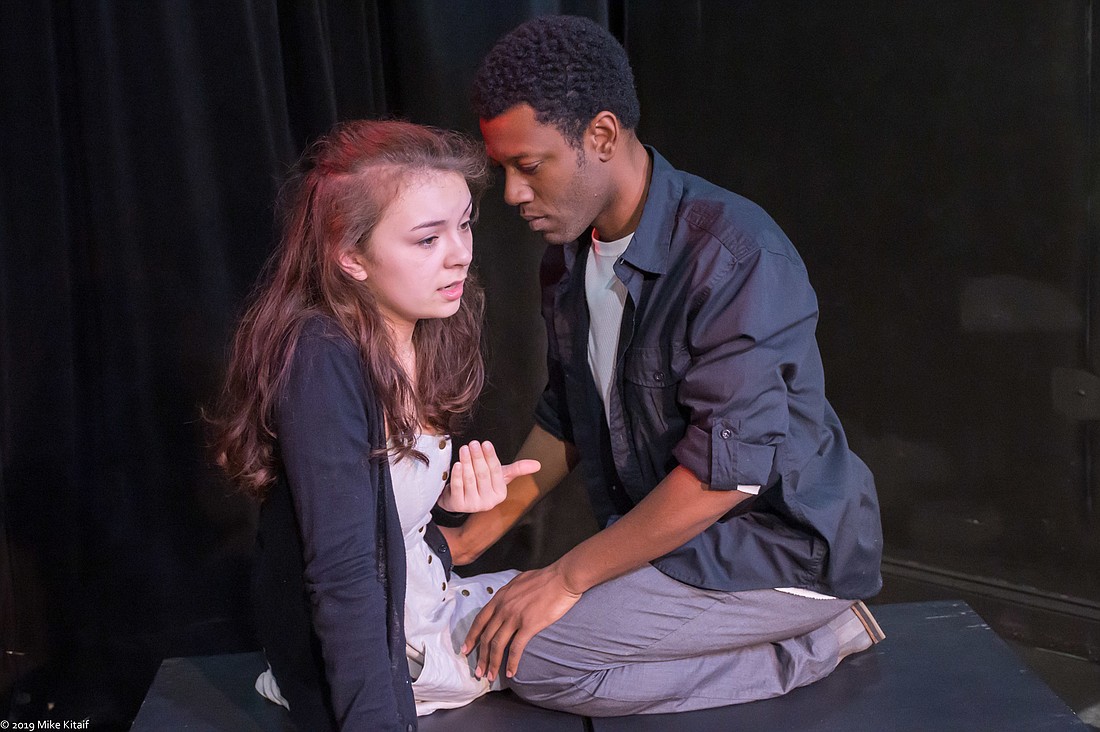- November 23, 2024
-
-
Loading

Loading

Amber Cohen and Tom Anthony, two freshmen at Princeton University, spend a night together that, because of how much they both drank, neither of them can remember with perfect clarity. What can be remembered leads to a rape allegation in the not-too-distant past when universities handled such matters in-house, and the two students must grapple with the aftermath of something each recalls differently.
This premise, for the play “Actually” by Anna Ziegler, is what compelled Beau Wade to purchase and read it on a whim. Wade is now directing a production of the play which will run from Dec. 12 to 15 at the City Repertory Theatre.
“This is the kind of theater our audiences come for,” Wade said. “It’s about perspectives, and the way our personal filters shape how we interpret events.”
“Taking it now through the lens of the #MeToo movement, it’s amazing to realize how much has changed in a three-year span,” said stage manager Angela Young.
Wade and Young shared the challenge, not uncommon in theater, of coordinating a production that hinges entirely on two actors in an intimate space. They decided to embrace that intimacy, using two moveable platforms as the only set pieces and a flask as the only prop. The floor has been painted shades of gray, and the actors’ costumes match, reflecting the gray area of the fateful night’s ambiguous events.
It is left to sound designer Paul van de Graaf, sound operator Nick Sok and lighting technician Savanna Dacosta to do the rest, sculpting the subjective soundscapes and shadows of the characters’ recollections.
The scale of the production may be small, Dacosta said, “but the story they’re telling is huge.”
The actors, Brent Jordan and Nikki Lynn, were up to the challenge. Walking around barefoot with no scenery to draw the audience's gaze from them was a vulnerability they welcomed.
"I'm fine with these eyes on me," Jordan said.
"It's less distracting," Lynn said. "You wouldn't be wearing Adidas in a liminal space."
Jordan was Wade’s first choice to play Tom, having known the actor for 10 years.
“I was honored,” Jordan said.
Lynn was found after much auditioning and a read-through with Jordan.
“It was very quickly evident they had a chemistry that worked very well together,” Wade said.
When the show opens, they will have been rehearsing for almost a month, showing up most days of the week.
“It’s fun!” Lynn said. “You’re continuing a chain of thought for two hours, and you have to keep attached to that.”
“It’s maybe the longest I’ve spoken at a single time onstage,” Jordan said.
They both connected to their characters as the kind of people they could have met in their first year of college, perhaps not far removed from the people they remember being. They struggle with familiar questions of gender, of race (Jordan and Tom are black, Lynn and Amber are white), of identity: Am I the person I think I am? Even at their most eloquent, the characters’ vernacular is modern, their feelings raw and unadorned.
In real life, Jordan said, “Not everything you say is as manicured as you want it to be.”
“These are real people,” Lynn said. “They say things that are offensive sometimes, because they’re not perfect.”
Young said they have reached out to local colleges like Embry-Riddle Aeronautical University and Daytona State College about their students coming to see the show.
“It’s a situation they could live through,” she said.
Yet while the play’s questions about consent and memory are weighty, Wade wanted the production to emphasize “the human connections that can be forged.”
“Despite the subject matter,” he said, “I believe it’s a love story.”
The play, Wade, Young and the actors said, is not about right or wrong, guilt or innocence. It’s about whether or not these two people will be OK.